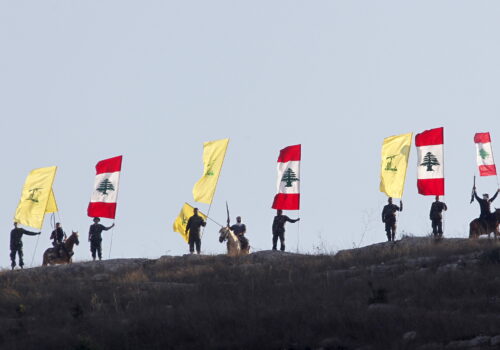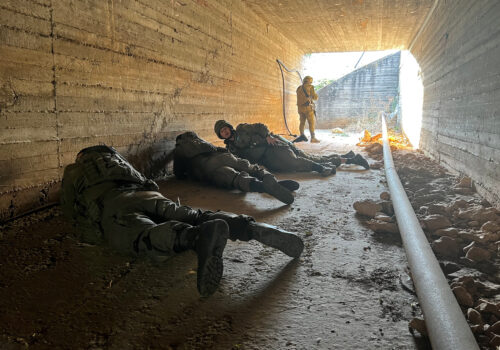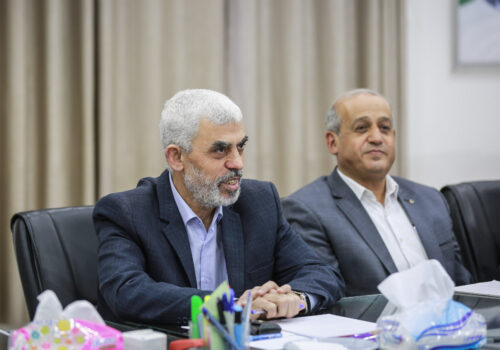After a failed attack, Hezbollah’s propaganda seeks to prevent a wider war with Israel
For almost a month, the Middle East and the international community waited on edge for Hezbollah’s retaliation for Israel’s assassination of its military commander Fuad Shukr in Beirut on July 31. Its promised vengeance finally materialized on the morning of August 25. Hezbollah’s attack appears to have largely been a failure, and it remains unclear if it will engage in follow-up strikes. But what the group’s rockets failed to do, its propaganda organs will fill, giving the image to Hezbollah’s base that it is capable of settling scores with the Israelis.
The delay in Hezbollah’s retaliation for Shukr wasn’t caused by its relative weakness to Israel or fear of Israel’s response alone. When the group began attacking Israel on October 8, 2023, it intended to become a full “part of the battle,” in Secretary-General Hassan Nasrallah’s words, that erupted the day prior when Hamas and other Palestinian militant groups attacked southern Israel, dubbed “Al-Aqsa Flood.” The purpose of this “support front,” laid out clearly by Nasrallah on November 3, 2023, was to burden Israel—militarily, economically, and societally—with a two-front war to slow its campaign in the Gaza Strip and ensure that “the Palestinian resistance in Gaza, and Hamas, in particular, emerge victorious.”
Committed as Hezbollah is to saving its Gaza-based allies, the group does not currently want a full war with Israel. The conditions for Hezbollah and its broader allies in the Iranian-led Resistance Axis are simply not optimal. On October 8, 2023, as now, the group was burdened with navigating Lebanese domestic woes: an economy and currency that collapsed almost five years ago, Gulf and Western foreign backers cutting aid, a presidential vacuum, and the resulting political stagnation. Compounding Lebanon’s problems with provoking a war with Israel for the sake of Palestine—important as the cause may be for the average Lebanese—risked a backlash that Hezbollah would prefer to avoid.
SIGN UP FOR THIS WEEK IN THE MIDEAST NEWSLETTER
Launching the current war of attrition allowed the group to balance its Resistance Axis obligations with domestic Lebanese considerations. Growing international and American pressure on Israel generally, but specifically not to open a full Lebanese front, enabled Hezbollah to control the tempo of this conflict—reinforcing its pro-Palestine bona fides while being assured that the fighting would remain contained.
But even the best-laid plans oft go awry. Already in April, Nasrallah’s deputy Naim Qassem was complaining that Hezbollah “didn’t expect the war would last this long.” But, having committed to fighting until Israel halted its Gaza campaign, the group couldn’t unilaterally back down without appearing weak. Stuck, and with fighting dragging on, the mutual attrition increasingly leaned in Israel’s favor. Israel has killed more Hezbollah fighters, including senior commanders, and destroyed more critical assets than the reverse. An estimated ninety thousand to one hundred thousand south Lebanese have been displaced from the fighting zone, burdening an already-bankrupt Lebanese state—one which will have to absorb the south’s reconstruction costs but with far fewer resources than Israel’s economy.
Hezbollah’s situation became more complicated after July 27, when an errant rocket from the group struck a soccer field in Majdal Shams in the Golan Heights and killed twelve children. The Israelis retaliated by assassinating Shukr in Beirut and then claiming the attack. From that moment on, Hezbollah couldn’t proceed as usual. Israel had publicly humiliated the group, whose silence on the assassination would have made them look weak and helpless to their base. It also allowed their Israeli adversaries to set the red lines of the conflict—both the ongoing war of attrition and the broader conflict between the two adversaries.
“Rejoice and laugh a little, you will cry much,” Nasrallah threatened the Israelis. “Our response is definitely coming… there is no debate on this, and the days, nights, and battlefield will decide between us,” he said. A week later, on August 7, he stressed that Hezbollah could not deal with Shukr’s assassination “as an ordinary aggression” and that Hezbollah would respond as necessary “no matter the consequences.”
In the intervening weeks, Hezbollah sought to distract its base from its silence over Shukr. Conveniently for Hezbollah, Gaza ceasefire negotiations resumed just in time to justify the delay. For so long as talks continued, the group could claim that it was holding off retaliation not due to weakness or fear of war but to avoid undermining the larger, primary goal of ending the war in Gaza. Moreover, for so long as ceasefire talks continued, Hezbollah could claim that the threat of its retaliatory attacks was inducing Western powers—averse to a conflict in Lebanon—to pressure Israel into accepting a deal and the Israelis to agree.
Meanwhile, it had reframed any delay as “part of the punishment,” an old propaganda tactic deployed by Hezbollah whenever it was pressed to respond to an Israeli provocation but incapable of doing so. The group also unveiled its Imad 4 underground tunnel facility—a revelation meant to shore up its image with its supporters rather than expose a strategic, game-changing asset in the war with Israel. The revelation, in fact, appears to have achieved its intended effect, with pro-Hezbollah social media accounts—to the extent this is an accurate gauge of popular opinion—celebrating the announcement and, in some instances, the possibility that Hezbollah’s tunnels had already reached Tel Aviv. Simultaneously, Hezbollah has intensified its attacks over the past few weeks—albeit squarely within the “rules of the game” governing the conflict since October 8, 2023.
But according to credible reporting—later confirmed by Nasrallah—by August 25, Hezbollah felt it had waited enough, especially as it saw ceasefire talks and, therefore, its cover for delaying revenge fraying. The coincidence with Arbaeen, marking forty days from the commemoration of the death of Imam Hussein, added the type of symbolism with which Hezbollah enjoys imbuing its actions. The Israelis, seemingly fully prepared for the attack, launched a preemptive strike—with a hundred fighter jets destroying an estimated 6,000 projectiles belonging to Hezbollah, including drones aimed at the Gush Dan region in Central Israel. The group, nevertheless, managed to launch a claimed 320 Katyusha rockets—the Israel Defense Forces (IDF) identified a lower number of 210 rockets and twenty drones—which it said “targeted Israeli barracks and positions [in northern Israel] to facilitate the path of attack drones towards its intended target in the depth of the Entity [i.e. Israel].”
Once again undeterred by reality, Hezbollah immediately spun the operation as a “total success.” The group later followed up by claiming all drones had launched and struck their targets, which its sources falsely told Al-Jadeed and Al-Araby television were “two vital targets in northern Tel Aviv,” and denied that Israel had launched a preemptive strike. Nasrallah drove the point home later in the day, claiming that “our information confirms” the drones launched by Hezbollah had struck their intended targets: Israeli Military Intelligence Unit 8200’s and Mossad’s Headquarters in Glilot, in northern Tel Aviv. He also purported to pick apart Israel’s “narrative of a preemptive strike.” The Israelis, he alleged, only noticed Hezbollah’s movements at the last minute and ended up attacking evacuated bases and positions, “a failure of Israeli intelligence and preemption.”
Therefore, though Hezbollah opted for the riskiest retaliatory option—a massive individual strike—it once again deployed its propaganda machine to bridge the gap between reality and the image it wants to project to its followers and claim success. It can thus tread the very fine line of settling the score for Shukr, appearing strong before its base but not granting Israel sufficient justification or legitimacy to initiate a full war.
Meanwhile, ceasefire talks are set to resume. If they succeed, Hezbollah can then claim a double victory. The group can assert that its support front helped coerce the hated Zionists to cave to Hamas’ demands and prematurely end their war in Gaza without achieving their war aims of dismantling the Sunni terror organization. Additionally, Hezbollah can boast of forcing tens of thousands to flee from their homes and creating, for the first time in Israel’s history, a de facto security zone inside Israeli territory—a situation that Israel failed to reverse with its military might.
Shukr’s death, the group can then claim, was a necessary sacrifice to achieve these two goals—particularly the latter, which it can spin as hastening the destruction of Israel and liberation of Palestine “from the river to the sea.” Hezbollah, as its statements suggest, could then still patiently plan yet another attack to avenge Shukr. This could come in the form of a similar attack to the one on August 25—either individually or alongside Iran and the rest of the Resistance Axis. Or, perhaps, the group could act as they did after Israel assassinated Imad Mughniyeh in 2008, waiting years to strike at an Israeli soft underbelly target in a manner that will make the group’s intention clear.
Here, the group could target Israelis abroad or activate assets cultivated within Israel to conduct an attack inside a major Israeli city. This past week, a failed suicide bombing was attempted in Tel Aviv. While Hamas and Palestinian Islamic Jihad took credit, Israeli Police and Shin Bet said the device’s sophistication suggested Hezbollah’s potential involvement—recalling the March 2023 roadside bombing in northern Israel’s Megiddo. This could harm the Israelis and send the proper message while giving Hezbollah enough plausible deniability to avoid sparking a full war.
David Daoud is a senior fellow at the Foundation for Defense of Democracies (FDD), focusing on Hezbollah, Israel, and Lebanon issues. Follow him on X: @DavidADaoud.
Further reading
Tue, Feb 13, 2024
Lebanon is using Hezbollah to blackmail Israel on border talks
MENASource By
The Lebanese government seems to believe that it will get better terms as international desperation to stop Hezbollah’s attacks grows.
Tue, Jun 11, 2024
Hezbollah escalates in the shadow of US-Israel tensions over Rafah
MENASource By
Hezbollah intensified its attacks against Israel since early May—shifting from pulling its punches on causing Israeli casualties to noticeably seeking to draw blood.
Tue, Jul 2, 2024
Hamas’s resistance doctrine is making it harder to broker a deal
MENASource By
Hamas views its resistance as religiously mandated, and nine months of military and political pressure have not altered its position.
Image: People watch Lebanon's Hezbollah leader Sayyed Hassan Nasrallah delivering a televised address, as they sit at a cafe in Sidon, Lebanon August 25, 2024. REUTERS/Hassan Hankir


